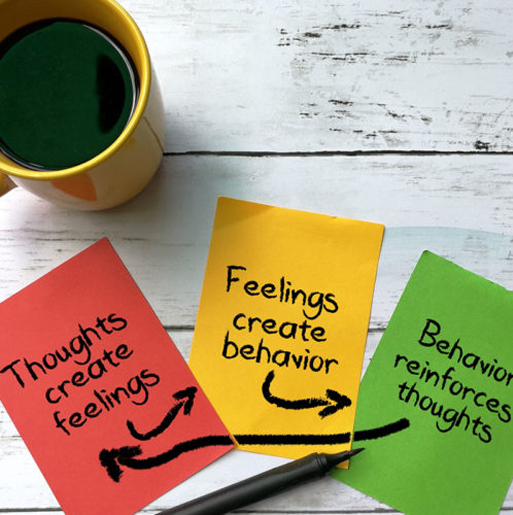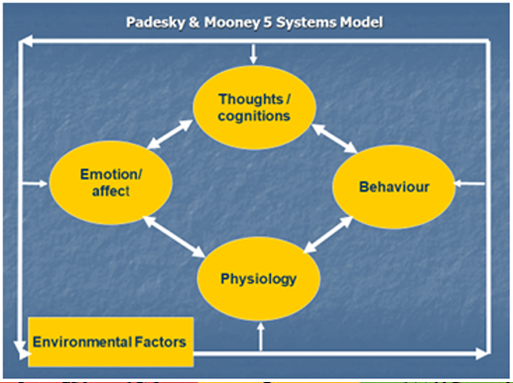

Ascend-PsyCare offers specialized and world-class Cognitive Behavioral Interventions for a variety of psychological problems and for all age-groups delivered by highly experienced and trained therapists. We follow the Beck’s CBT model and offer individualized treatment plans suited to Indian context and individual’s needs.
Cognitive behavioral therapy (CBT) is a type of psychological intervention which aims to improve mental health. CBT focuses on challenging and changing unhelpful cognitive distortions (e.g. thoughts, beliefs, and attitudes) and behaviors, improving emotional regulation (awareness and control over one’s and others’ emotions) and the development of personal coping strategies that focus on solving current problems. Originally, it was designed to treat depression, but its uses have been expanded to include treatment of a number of mental health conditions, including anxiety, substance abuse, eating disorders, life-style diseases management, couples work, and many more. CBT is one of the few psychotherapies that use evidence-based techniques and strategies.

The CBT model (Beck, 1968) is based on the combination of the basic principles from behavioral and cognitive psychology. It is different from historical approaches to psychotherapy, such as the psychoanalytic approach where the therapist looks for the unconscious meaning behind the behaviors and then formulates a diagnosis. Instead, CBT is a "problem-focused" and "action-oriented" form of therapy, meaning it is used to treat specific problems related to a diagnosed mental disorder.
The therapist's role is to assist the client in finding and practicing effective strategies to address the identified goals and decrease symptoms of the disorder. CBT is based on the belief that thought distortions and maladaptive behaviors play a role in the development and maintenance of psychological disorders, and that symptoms and associated distress can be reduced by teaching new information-processing skills and coping mechanisms.
Anxiety and phobias; obsessive compulsive disorder; depression; insomnia; eating disorders; relationship or marital difficulties; sexual problems; drug, tobacco and alcohol abuse; chronic irritability or excessive anger; unwanted repetitive habits; stress related medical problems (headache, hypertension, palpitations; childhood problems (hyperactivity, bedwetting, school phobias, depression, anxiety); work life issues; loss and bereavement; fertility & women’s issues; psychophysiological ailments; attention deficit hyperactivity disorder (ADHD), LGBTQ community mental health issues, and many more.
Psychologists, Clinical Social Workers, Psychiatrists and Professional Counselors are able to perform CBT if they have the relevant training and expertise.
Psychiatrists are medical doctors with a MD degree in Psychiatry while Psychologists are usually Behavioural scientists with an MA/MSc and/or a PhD degree in Psychology/Clinical Psychology. The main treatment used by Psychiatrists is medications while that used by psychologists are talking therapies – counseling and psychotherapy.
Counseling and Psychotherapy are often considered to be interchangeable therapies that overlap in a number of ways. Counseling usually refers to a brief treatment that focusses on behaviour patterns. Psychotherapy focuses on working with clients for a longer-term and draws from insight into emotional problems and difficulties.
Counseling usually focuses on a specific problem and taking the steps to address or solve it. Problems are discussed in the present-tense, without too much attention on the role of past experiences. Though the titles “counselor” and “advisor” are often used like synonyms, counselors rarely offer advice. Instead, counselors guide clients to discover their own answers and support them through the actions they choose to take.
Psychotherapy, like counseling, is based on a healing relationship between a health care provider and client. Psychotherapy, or therapy for short, also takes place over a series of meetings, though often it has a longer duration than counseling. Some people participate in therapy off and on over several years.
The aim of psychotherapy is to resolve the underlying issues which fuel ongoing complaints. Psychotherapists help to resolve past experiences as part of laying the foundation for a satisfying future.

Mental health and Illness are on a continuum. Counseling services are more helpful in times of momentary or situational distress where the person’s level of functioning is not otherwise disturbed (healthy to reacting on the continuum) while Psychotherapy services are more useful in times where one’s functioning is getting impaired (Injured to Ill on the continuum)
CBT is mainly a talking-listening-reflecting type of activity based on a healthy therapeutic relationship between the therapist and patient/client. Cognitive therapists can’t prescribe medicine but they can discuss the advantages and disadvantages of medication with you. Many patients are treated without medication at all. Some disorders, however, respond better to a combination of medication and cognitive therapy. If you are on medication, or would like to be on medication, you might want to discuss with your therapist whether you should have a psychiatric consultation with a specialist to ensure that you are on the right kind and dosage of medication. If you are not on medication and do not want to be on medication, you and your therapist might assess, after four to six weeks, how much you’ve progressed and determine whether you might want a psychiatric consultation at that time to obtain more information about medication.
The length of treatment varies depending upon each individual and the scope of issues that are to be addressed during therapy. There is no exact answer or exact number of sessions needed to be effective. However, CBT is a shorter-term therapy which can be as short as between 12 and 20 weeks.
One way is to ask your therapist how you might be able to supplement your psychotherapy with cognitive therapy readings, workbooks, client pamphlets, etc. A second way is to prepare for each session, thinking about what you learned in the previous session and jotting down what you want to discuss in the next session. A third way to maximize therapy is to make sure that you try to bring the therapy session into your everyday life. Therapists should make sure you take home notes or a recording of anything you want to remember, both changes in your thinking and an action plan to follow during the week.
Sessions are held usually once a week at a mutually convenient time and date. However if required more sessions can be held.
At Ascend PsyCare we believe in quality care within affordable cost. So, fee structures vary depending on the age and the financial status of the patient/client. Fee can range between Rs. 800 to 2500 per session.